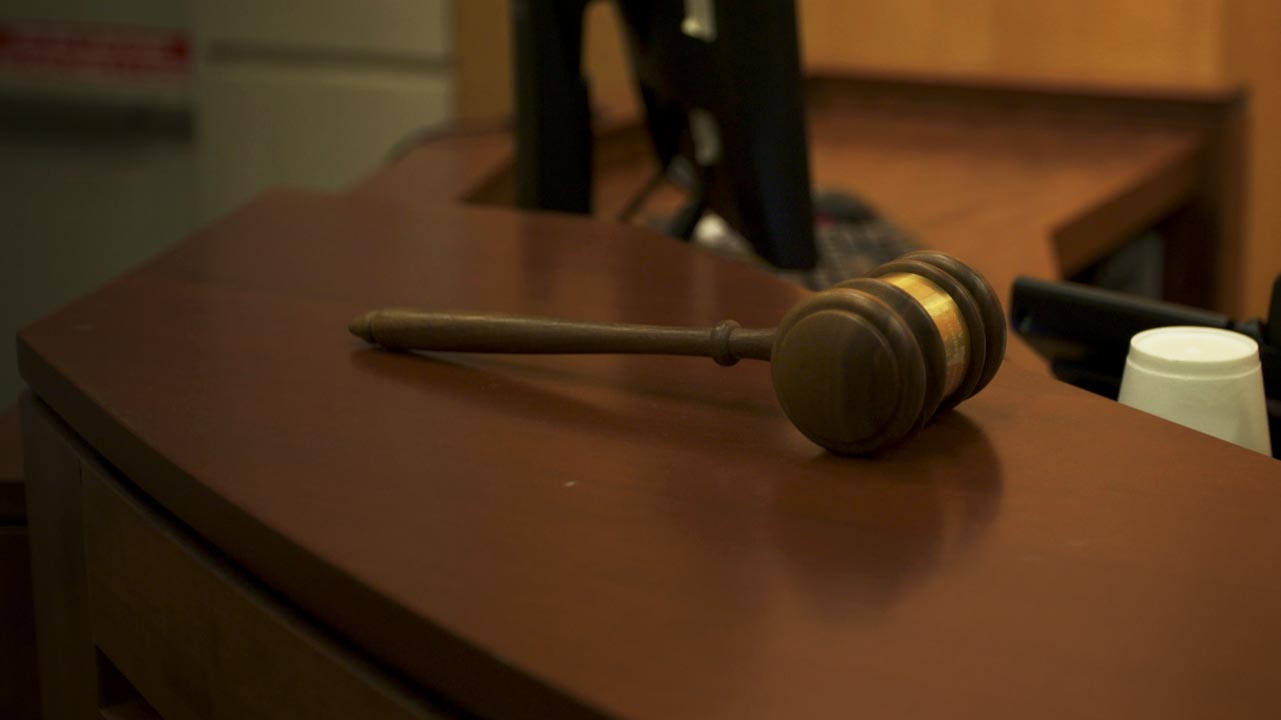 A file image of a judge's gavel in a courtroom at the U.S. District Court for the District of Arizona.
A file image of a judge's gavel in a courtroom at the U.S. District Court for the District of Arizona.
There are 25 judges on the ballot in Pima County, and it's up to voters to decide whether they should keep their jobs. But many voters aren't sure how to judge a judge.
Judges aren't politicians. They don't create policy or spend taxpayer dollars, but their rulings have a big impact on life in Arizona. This year alone, the Arizona Supreme Court ruled Gov. Doug Ducey's order postponing the enforcement of evictions could stand after it was challenged by landlord groups, yet Ducey was forced to allow gyms to reopen after a ruling by Maricopa County Superior Court Judge Timothy Thomason.
The state Supreme Court kicked the Invest in Ed ballot measure off the ballot two years ago, but saved it from the same fate this year after Maricopa County Superior Court Judge Christopher Coury booted it over the wording of its petition.
In Arizona, the governor appoints judges but voters decide whether to retain them. The unique role of judges as referees for democracy can make them particularly challenging to vet for voters considering whether they should retain a judge.
The Arizona Commission on Judicial Performance Review rates judges based on traits like legal ability, integrity and temperament. Since 1992, the commission has vetted judge candidates for approval by the governor.
All of the state Supreme Court justices, Appeals Court judges and Pima County Superior Court judges received unanimous support from the commission.
Some voters might want to look at how judges ruled on issues that are important to them, but there's no uniform tracking system for that. The conservative Center for Arizona Policy has a voter guide that shows how judges have ruled in the past, but it doesn't track rulings for Superior Court judges.
How have judges ruled in the past?
Arizona Supreme Court
- Ruled sentencing juveniles to de facto life terms is constitutional. (State of Arizona v. Martin Raul Soto-Fong)
- Ruled gay couples get the same parental rights as straight couples. (Kimberly McLaughlin v. Jones/Suzan McLaughlin)
- Ruled Tucson couldn't destroy confiscated guns because of a state law that requires them to be sold. (State ex rel Brnovich v. City of Tucson/DeWit)
- Ruled Arizona law that increased sentences for threatening or intimidating if the defendant is a member of a criminal gang is unconstitutional. (State of Arizona v. Christopher Arevalo)
- Ruled voter-approved provision in state Constitution that prevented accused sex offenders from being eligible for bail is unconstitutional. (State of Arizona v. Hon. Wein/Goodman)
- Ruled Arizona lethal injection law is constitutional. (State of Arizona v. Shawn Patrick Lynch)
- Ruled sentencing juveniles to de facto life terms is constitutional. State of Arizona v. Martin Raul Soto-Fong)
- Ruled a Phoenix ordinance that could have compelled an art studio to do business with a gay couple is unconstitutional. (Brush & Nib et al v. City of Phoenix)
- Ruled Tucson couldn't destroy confiscated guns because of a state law that requires them to be sold. (State ex rel Brnovich v. City of Tucson/DeWit)
- Ruled Arizona law that increased sentences for threatening or intimidating if the defendant is a member of a criminal gang is unconstitutional. (State of Arizona v. Christopher Arevalo)
- Dissented in ruling that voter-approved provision in state Constitution that prevented accused sex offenders from being eligible for bail is unconstitutional. (State of Arizona v. Hon. Wein/Goodman)
- Ruled sentencing juveniles to de facto life terms is constitutional. (State of Arizona v. Martin Raul Soto-Fong)
- Ruled gay couples get the same parental rights as straight couples. (Kimberly McLaughlin v. Jones/Suzan McLaughlin)
- Ruled Tucson couldn't destroy confiscated guns because of a state law that requires them to be sold. (State ex rel Brnovich v. City of Tucson/DeWit)
- Ruled Arizona law that increased sentences for threatening or intimidating if the defendant is a member of a criminal gang is unconstitutional. (State of Arizona v. Christopher Arevalo)
- Dissented in ruling that voter-approved provision in state Constitution that prevented accused sex offenders from being eligible for bail is unconstitutional. (State of Arizona v. Hon. Wein/Goodman)
- Ruled a Phoenix ordinance that could have compelled an art studio to do business with a gay couple is unconstitutional. (Brush & Nib et al v. City of Phoenix)
Court of Appeals, Division 2
- Ruled Tucson Electric Power can increase rates on business customers to subsidize residential ratepayers. (Freeport Minerals Corp. v. Arizona Corporation Commission; Tucson Electric Power)
- Ruled Arizona law governing juvenile life sentences does not violate the constitution. (State of Arizona v. Joey Lee Healer)
- Ruled Pima County's Fast Trial and Alternative Resolution Program (FASTAR) does not violate the constitution. (Claudia Duff v. Tucson Police Dept.;City of Tucson)


By submitting your comments, you hereby give AZPM the right to post your comments and potentially use them in any other form of media operated by this institution.